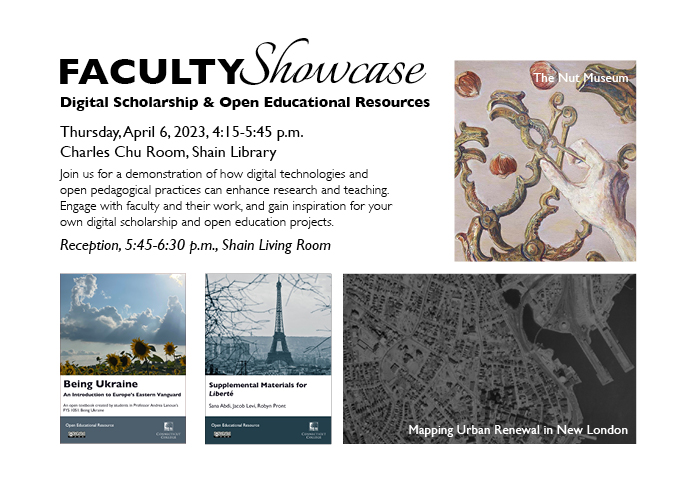
Thank you to everyone who attended last night’s Faculty Showcase of Digital Scholarship & Open Educational Resources. We heard about scholarly and creative work that lie outside the traditional journal and monograph publishing venues, innovative pedagogies that empower students to create and openly share information, and how technology can foster equity among students.
Digital Scholarship
Lyndsay Bratton introduced the digital scholarship presentations, both of which were supported through the Digital Scholarship Fellows program. Both projects had long histories, and the faculty members came to the Digital Scholarship Fellows program with hopes of transforming previous iterations of their work. These projects represent the iterative nature of working and publishing in digital formats.
Christopher Steiner, the Lucy C. McDannel Professor of Art History and Anthropology and Director of the Museum Studies Program discussed his website project for the Nut Museum, a collection which has been stewarded since 2002 by Connecticut College, and by Chris in particular. The goal for Chris’s digital project is to make the hidden collection visible.
Anna Vallye, Assistant Professor of Art History and Architectural Studies presented her project, Mapping Urban Renewal in New London, 1941-1975, which began its digital life as an ArcGIS Story Map, and is now in the process of redesigning and migrating to WordPress. Anna decided to migrate technology platforms in order to recover full ownership and control over her work. An interesting aspect of this project is that the digital project led to an invitation to publish an edited print book, which included student authored chapters.
Open Educational Resources and Open Pedagogy
Ariela McCaffrey introduced the last two presentations which related to open pedagogy practices, decolonization of language curricula, reducing the cost of course materials, and engaging students as co-creators of information.
The French and Francophone Department’s presentation, delivered by James Austin, Robyn Pront, and Sana Abdi, focused on the creation of open educational resources. The department adopted the open textbook, Liberté, for their beginning French language courses, to reduce costs to students, improve learning outcomes, and provide expanded cultural content. This transition required the creation of a wide variety of supplemental materials, many of which will be available in a publicly accessible ebook.
Andrea Lanoux, Elizabeth S. Kruidenier ’48 Professor of Slavic Studies, shared an open pedagogy project she ran with her First Year Seminar, Being Ukraine. For the class, students created an openly available ebook about Ukraine’s history and culture. The assignment was carefully scaffolded, providing students ample time to write and research their chapters before uploading their content using the PressBooks platform. The book is publicly available, allowing students to share their work with family or include a link on resumes and applications for Centers and Pathways.
This event provided a forum for faculty to share and learn about the exciting work happening in the areas of digital scholarship and open pedagogy, with all its benefits, surprises, and challenges. Finally, we discussed the relevance of digital scholarship and open pedagogy projects in the promotion and tenure process, as they require a great level of commitment and are related to all three areas of consideration: teaching, service, and scholarship.
If you have a project you would like to share at a future event, please let us know!
